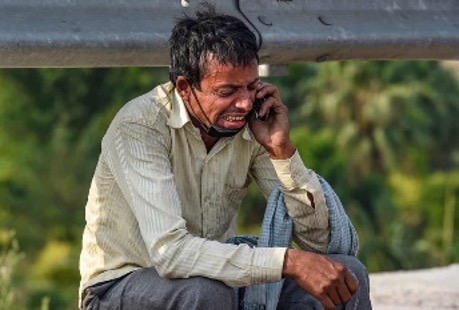

| “Are the NRIs at the mercy of the authorities for a ‘right to return?’ Don’t they deserve a better reception when they arrive home during a crisis such as this? At the minimum, don’t the migrant laborers deserve an advance notice of an impending shutdown so they could safely plan for their right to return home? These questions cry out for answers from those who sit in the citadels of power and appear indifferent to the plights of the NRIs and poor migrant laborers.” |
“Instead of bringing home the stranded nationals, during the lockdown, they were left to fend for themselves under trying conditions to the detriment of their health and wellbeing. A state like Kerala that lives off the foreign NRI remittances appeared to have placed several roadblocks before the returning residents even from neighboring States. By requiring COVID negative certificates and delaying entry clearance documents, Kerala has sent mixed signals of readiness. In their eagerness to score brownie points from the International media for their management expertise containing the contagion’s spread, NRI interests have become the sacrificial lambs at the altar of provincialism and self-indulgence.”
Article 13 of the Universal Declaration of Human Rights says that ‘everyone has the right to freedom of movement and residence within the borders of each state, and everyone has the right to leave any country, including his own and to return to his country’. However, during the pandemic’s challenging times, these grand old principles have taken a severe beating. Many countries, including India, may not have said ‘No’ to their citizens but advertently or inadvertently put roadblocks in every which way of their timely return to the home country.
The right to return is a principle in international law that guarantees that everyone has a right of voluntary return to or re-entry to their country of origin or citizenship. International covenant on civil and political rights Article 12 (4) states that ‘No one shall be arbitrarily deprived of the right to enter his own country’. The right of a person to return to his own country recognizes the special relationship of a person to that country.
Aren’t we supposed to be a global village where our lives have been transcended into a borderless world? Well, COVID-19 has changed everything! The famous writer and columnist Thomas Friedman’s dream of the ‘world is flat, and the theory of globalization now shifted into warp drive’ appears to have gone out of the window. The countries one by one started erecting new barriers and preventing people from traveling to their desired destinations. They were soon deciding which foreign nationals are welcome and who are not. Next, they were closing borders and effectively shutting down all travel and thereby stranding millions of foreign nationals away from their homes.
What happened consequently is a story of people everywhere of pain and sufferings of immense proportions. Although many countries facilitated their nationals’ return through provisional means of transportation, millions more were left in a quandary without adequate finances or accommodations. Take, for example, the sad cases of Keralites, who got trapped in the Middle East due to the central government’s inaction or bureaucratic bungling. Many of them were confined to a single room, some infected with COVID, and few others either furloughed or out of work lacking resources for food or essential medicines.
After the initial evacuation of a few thousand NRIs from places like China, Italy, and few other places, India sealed its borders, closed the airports, and stopped train and bus services, and practically shut down the entire country. The Modi Government gave just four hours of notice before making the whole country comes to a standstill. Millions of migrant laborers who were caught off guard by these fast-moving developments became the ultimate victims of this horrific tragedy orchestrated by a government’s ill-advised action.
“Air India, the national carrier known for its money-losing ways, wasted no time exploiting the situation to its advantage in charging exorbitant prices for a one-way journey. It is not only the Government and the Bureaucracy that has done a disservice to the Indian nationals who are living abroad, but also the neighbors and friends who have targeted them and falsely accused them as carriers of Covid virus.”
A photograph of an Indian in the Guardian newspaper, his face contorted with anguish talking with his wife about his sick boy has come to symbolize the plight of the migrant laborers who are penniless but had to walk hundreds of miles under extreme conditions, to reach home! The right to return principle also applies to these migrant laborers within a country. In one of the court rulings by the International Court of Justice, a criterion established for the right of return includes “close and enduring connection,” “tradition,” “establishment,” “interests,” and “family ties.” It includes not only the right to return after having left one’s own country; it may also entitle a person to come to the country for the first time if he or she was born outside the country.
Many of these conventions and rules were allegedly circumvented or violated by those in power for political expediency. Instead of bringing home the stranded nationals, during the lockdown, they were left to fend for themselves under trying conditions to the detriment of their health and wellbeing. A state like Kerala that lives off the foreign NRI remittances appeared to have placed several roadblocks before the returning residents even from neighboring States. By requiring COVID negative certificates and delaying entry clearance documents, Kerala has sent mixed signals of readiness. In their eagerness to score brownie points from the International media for their management expertise containing the contagion’s spread, NRI interests have become the sacrificial lambs at the altar of provincialism and self-indulgence.
Thomas T. Oommen, a community activist in New York who is an intercessor for the NRIs regarding passports and visas with the consular offices, told a heartbreaking story of a family on an H-1B visa refused by Air India to board because their newborn baby only carried an OCI card. Having lost the job, this family vacated their apartment, sold off their possessions, and were ready to move back to India when they were turned back. This bureaucratic mischief not only denied the right to return of a national but also questioned the very validity and reliability of the OCI card itself. Even without an OCI card, that baby is entitled to come to India because of the “family ties.” Although the politicos continue to hail the rights and privileges of the OCI cards, the hollowness of it all was so vivid throughout this pandemic period.
Air India, the national carrier known for its money-losing ways, wasted no time exploiting the situation to its advantage in charging exorbitant prices for a one-way journey. It is not only the Government and the Bureaucracy that has done a disservice to the Indian nationals who are living abroad, but also the neighbors and friends who have targeted them and falsely accused them as carriers of Covid virus. I agree with the premise that returnees ought to be responsible for their conduct as per the rules and regulations. However, there are cases of People who were denied the rightful entry to their apartments and families refusing to receive their loved ones as if they are perpetrators, not anything but hapless victims. Those accolades and praises showered upon the NRIs in the past by the politicians and their fellow citizens not only ring hollow now but expose their duplicity and insincerity at its highest form.
According to Human Rights Watch, “like all rights, the right to return binds governments. No government can violate this right. Only individuals may elect not to exercise it. Government’s legitimate security or health concerns should be met consistently with these principles and other internationally recognized human rights”.
Are the NRIs at the mercy of the authorities for a ‘right to return?’ Don’t they deserve a better reception when they arrive home during a crisis such as this? At the minimum, don’t the migrant laborers deserve an advance notice of an impending shutdown so they could safely plan for their right to return home? These questions cry out for answers from those who sit in the citadels of power and appear indifferent to the plights of the NRIs and poor migrant laborers.
(The author is a former Chief technology officer of the United Nations and Vice-Chairman of the Indian Overseas Congress, USA)





Be the first to comment